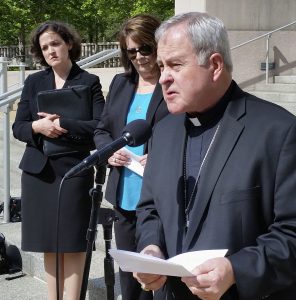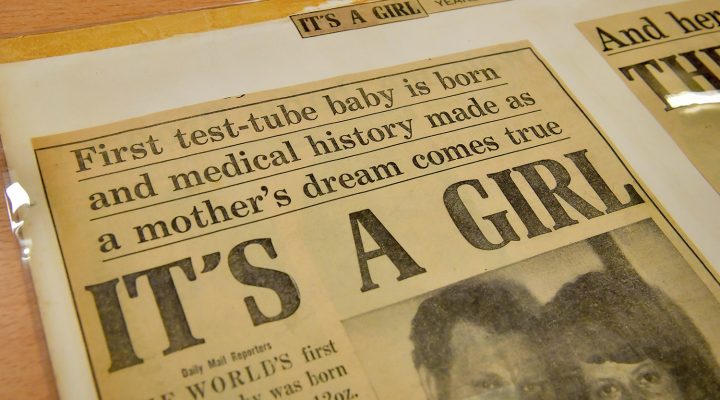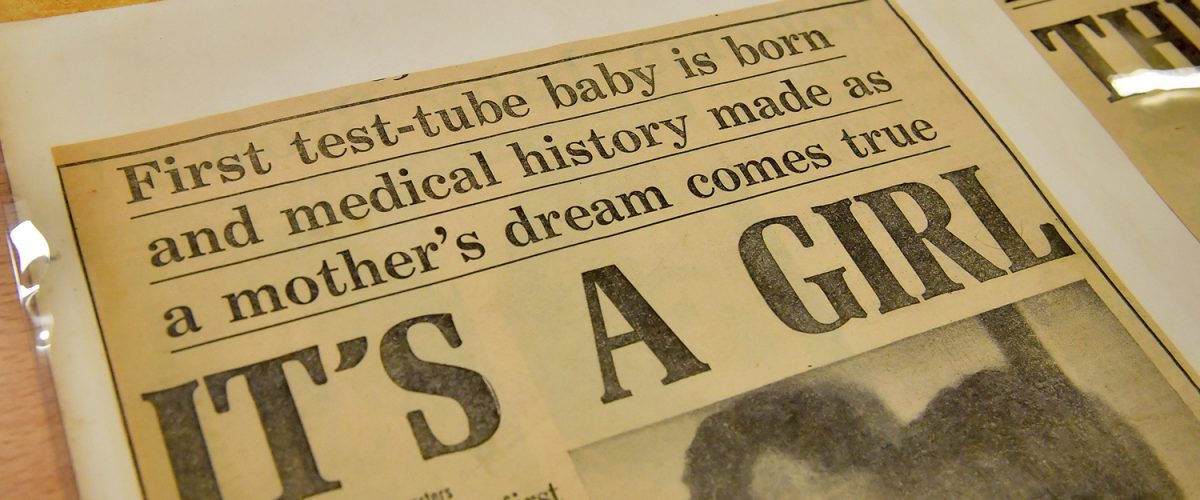The Southern Baptist Convention has not always opposed abortion, and Southern Baptists have not always opposed in vitro fertilization. This week’s adoption of an anti-IVF resolution by messengers to the SBC annual meeting represents yet another rightward shift in the nation’s largest Protestant denomination.
Abortion was not a litmus-test issue for Southern Baptists until it became a political wedge issue for Jerry Falwell and the Moral Majority in the 1970s. Notable SBC pastors — including W.A. Criswell of First Baptist Church in Dallas — publicly stated support for abortion in early stages of pregnancy and in case of rape, incest and deformity.
That all changed with the rise of the Religious Right, which identified abortion as a rallying cry after the racism of white Christians became unfashionable. The U.S. Supreme Court handed Falwell and company a megaphone with the 1973 Roe v. Wade decision legalizing abortion up to a certain point.
“Abortion was not a litmus-test issue for Southern Baptists until it became a political wedge issue for Jerry Falwell and the Moral Majority in the 1970s.”
The Religious Right rallied behind the anti-abortion cause as conservative Southern Democrats became Republicans and the Republican Party began its transition in identity from the country club to the county fair.
Confluence with ‘conservative resurgence’
Within the SBC, the abortion debate tagged along with the “conservative resurgence” — which allegedly was about biblical inerrancy — to hitch the denomination not only to the Republican Party but to the anti-abortion crusade.

Paul Pressler (Photo from Archives and Special Collections Library at Southeastern, Southeastern Baptist Theological Seminary)
During the time when conservatives — led by a stanch conservative Republican judge from South Texas — sought to capture control of the SBC, their early targets were the Christian Life Commission and the Baptist Joint Committee on Public Affairs. The CLC, which spoke to social issues, would not take up a strict anti-abortion stance. The BJC, which addressed only First Amendment issues, refused to add abortion politics to its portfolio.
As a result, Southern Baptists cut ties with BJC and reshaped the CLC into the current Ethics and Religious Liberty Commission. The ERLC is tasked with representing Southern Baptist views on both politics and social issues — often with little separation between the two.
Ironically, the ERLC today is under fire again from the far-right of the already rightward leaning SBC. Just this week, an effort was made on the convention floor to kill the ERLC since its president and trustees will not bend to the will of the mean-spirited abortion abolitionists mainly found among SBC Calvinists.
Make no mistake: The current ERLC is not liberal by any stretch of the imagination. Its leadership and public positions are stridently anti-abortion. But that’s still not enough for the far-far right.
Baptist-Catholic alliance
Thirty years ago, I heard church history professor Bill Leonard give a talk about declining denominational loyalty and the rise of social issue alliances. He took a marker to a white board and drew a series of vertical boxes, each labeled with the name of a denomination: Catholic, Baptist, Methodist, Episcopal, Lutheran, etc.
For most of the 20th century, he said, churchgoers remained loyal to their brand. If a family moved from Oklahoma City to Atlanta, they would seek out the same kind of church they left. It was rare for people to switch denominations, even when they moved cross-country.
Then he took another color marker and drew horizontal lines across the board, labeling each of them with a social or political issue such as abortion, immigration, religious liberty, the roles of women, family structure, etc.

Bill Leonard
Bill then explained: These horizontal lines are the future of religion in America. Today, we are abandoning our loyalty to denominations and finding stronger identities with affinity groups that cross denominational lines.
That may be the smartest thing Bill ever has said. He was 100% right, and we are living in the reality of that today.
Those horizontal lines explain why conservative Southern Baptists have more in common today with conservative Catholics than with liberal Baptists.
The very same Southern Baptist leaders — like Al Mohler — who disparage the pope and spew anti-Catholic venom from the 18th century find happy alliance with Catholics on the anti-abortion cause.
Roe wasn’t the end game
A lot of average Americans — even average Christians — thought the final objective of the anti-abortion crusade was overturning Roe v. Wade. But just as that victory finally came — somewhat suddenly and unexpectedly — the next page was revealed.
The new goal is the triple objectives of abortion abolition — meaning not only outlawing abortion in all circumstances without exception but also prosecuting women who terminate pregnancies — and attacking in vitro fertilization and blocking access to birth control.
This second goal may seem counter intuitive. After all, many in the pro-life movement have championed IVF as means of helping infertile couples give birth. Or so it seemed.
What most of us didn’t comprehend until that crazy Alabama Supreme Court ruling is that the language of the Catholic Church — that life begins at conception — has so infiltrated the anti-abortion movement that with Roe out of the way, activists turned their attention to the unused frozen embryos produced by IVF — embryos they believe are fully human and must be given every chance for birth.
The Mayo Clinic describes IVF this way: “During in vitro fertilization, mature eggs are collected from ovaries and fertilized by sperm in a lab. Then a procedure is done to place one or more of the fertilized eggs, called embryos, in a uterus, which is where babies develop. One full cycle of IVF takes about two to three weeks. Sometimes these steps are split into different parts and the process can take longer.”
Often, because these embryos are so fragile, multiple eggs are fertilized and stored — frozen — for later attempts.
“This is the natural outcome of saying ‘life begins at conception,’ which is neither medically accepted nor supported by Scripture.”
The strictest of anti-abortion advocates claim if those frozen cells are discarded or not implanted in a uterus that amounts to abortion. Remember, this is the natural outcome of saying “life begins at conception,” which is neither medically accepted nor supported by Scripture.
“Life begins at conception” is religious dogma, not medical fact. But it is strongly held religious dogma. So strong that some speakers at the SBC annual meeting addressing the resolution on IVF spoke of frozen cells in a locker somewhere as their beloved children and grandchildren.

What the resolution says
On Wednesday, June 12, messengers to the SBC annual meeting adopted a proposed resolution “On the Ethical Realities of Reproductive Technologies and the Dignity of the Human Embryo.”
Attempts were made from the floor of the convention to soften some of the language of the resolution, to make it sound less condemning of parents who use IVF to conceive. Those attempts failed, and the resolution was adopted as presented from the Resolutions Committee.
The resolution says, among many other points, that the “biblical creation order portrays the embodied union of husband and wife as the singular normative expression for procreation” and that “couples who experience the searing pain of infertility can turn to God, look to Scripture for numerous examples of infertility, and know that their lament is heard by the Lord.”
It declares “not all technological means of assisting human reproduction are equally God-honoring or morally justified” and says the IVF process “routinely creates more embryos than can reasonably be implanted, thus resulting in the continued freezing, stockpiling and ultimate destruction of human embryos, some of which may also be subjected to medical experimentation.”
This “destruction of embryonic human life” engages in “dehumanizing methods for determining suitability for life and genetic sorting, based on notions of genetic fitness and parental preferences,” the resolution continues.
It then calls on government authorities and medical personnel “to only utilize reproductive technologies consistent with” a pro-life viewpoint and speaks of “frozen embryonic human beings.”
The resolution calls on Christian couples struggling with infertility to “consider adopting frozen embryos in order to rescue those who are eventually to be destroyed.”
Church and state
Again, many of us were asleep at the switch while this ideology was gaining ground. What Jerry Falwell couldn’t accomplish in his lifetime, Donald Trump did in four years as president. He not only nominated the three Supreme Court justices who turned the tide on Roe v. Wade, he nominated other federal judges that hold extreme anti-abortion views.

St. Louis Archbishop Robert Carlson speaks at a news conference Monday, May 22, 2017, announcing a federal lawsuit to stop a St. Louis ordinance that prohibits discrimination based on “reproductive health decisions.” The suit says the law enacted in February infringes on freedom of religion rights of those who oppose abortion. Behind Carlson are attorney Sarah Pitlyk, left, of the Thomas More Society, a nonprofit law firm that filed the suit, and Peggy Forrest, executive director of Our Lady’s Inn, which provides services for pregnant women who are homeless and is a plaintiff in the lawsuit. (AP Photo/Jim Salter)
Exhibit A is Sarah Pitlyk, who was nominated to the federal bench by Trump and confirmed by the Senate on a party-line vote in 2019. She now sits on the U.S. District Court in St. Louis.
She was nominated and confirmed despite being evaluated as “not qualified” by the American Bar Association due to “the absence of any trial or even real litigation experience.” She also was confirmed with the full knowledge of her extreme anti-abortion views.
“She is exactly the type of judicial nominee that Trump promised to fill the courts with: an individual who threatens reproductive rights and access to abortion,” said Vanita Gupta, a former head of the Justice Department’s Civil Rights Division and now president of the Leadership Conference on Civil and Human Rights. “With Pitlyk’s confirmation, the administration is betting on her to carry out their agenda for decades to come.”
Before confirmation to the federal bench, she was allied with the Thomas More Society, a conservative legal advocacy group that promotes anti-gay, anti-transgender, anti-vaccine views of religious liberty that keep making it to the U.S. Supreme Court.
Connecting the dots
Here’s where we connect the dots to show the intersection of the SBC’s journey with the Religious Right’s journey with the Republican Party’s journey and see more clearly the destination.
Skye Perryman is a Baptist-educated lawyer who leads a national nonprofit group called Democracy Forward based in Washington, D.C. She’s been following the anti-abortion and anti-IVF story for years.
“What we saw with the SBC vote and the debate surrounding the vote is out of step with what the vast majority of religious people believe, out of step with what the vast majority of Christians believe,” she said. “It is part of a consistent and broader trend we see form various far-right legal and political organizations to oppose evidence-based health care policies and decisions.”

Skye Perryman
Further, the SBC resolution is “inconsistent with the foundational distinctives of Baptist life” such as soul freedom, she added, explaining that historically, Baptists have championed the God-given right of all people to make deeply personal decisions in their own consciences.
And this resolution must be seen in light of other resolutions adopted by the SBC this week, she added, such as a resolution on religious liberty that was challenged from the floor by Baptists who want to deny religious liberty to people who are not Christian.
“This resolution reflects a highly concerning and all too common trend in the United States today to blur and eradicate the line between separation of church and state. The SBC is calling for public positions that would ban or restrict reproductive health care based on religious beliefs.”
This is a “flagrant violation” of church-state separation, she said. “It’s urging civic and public policies that reflect one particular religious commitment and worldview as opposed to policies that would affirm the diversity of viewpoints.”
And for anyone who thinks the anti-IVF crowd is so fringe as not to be taken seriously, she offered this warning: “Many never thought Roe was going to fall, and it did.”
Mark Wingfield serves as executive director and publisher of Baptist News Global. He is the author of Honestly: Telling the Truth About the Bible and Ourselves and Why Churches Need to Talk About Sexuality. His forthcoming book is Troubling the Truth and Other Tales from the News.
Related articles:
SBC engages feisty debate on meaning of religious liberty before adopting resolution
Don’t be lulled by the failure of the Law Amendment | Analysis by Mark Wingfield
Remembering the early days of controversy over IVF in America | Analysis by Kristen Thomason
Alabama politicians flee IVF backlash


